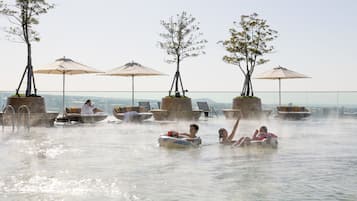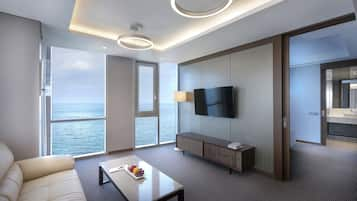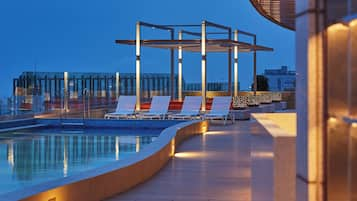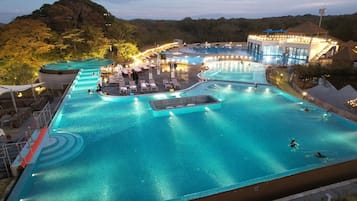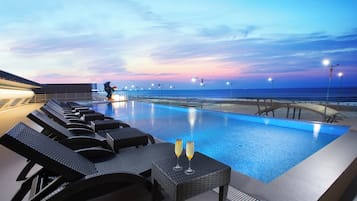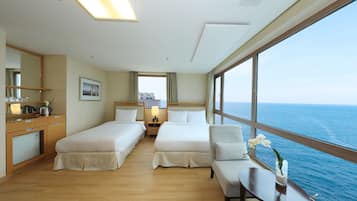Every corner of Jeju Island is a treat for the eyes, with many famous attractions to choose from. Jeju has unrivalled scenery, tree-covered mountain slopes, beaches, waterfalls, lava caves and neighbouring islands. Like trekking or taking a casual seaside stroll? Jeju has forest trails and recreational forests that are perfect to explore for visitors of all ages.
Family-friendly museums, galleries, science museums, theme parks and folk parks are must-visit destinations on Jeju Island. With many exciting options, plan ahead for the perfect schedule and comfortable accommodations. These are the places that locals love to visit for a fun day out in Jeju Island.
- 1
Hallasan Mountain
All-season hiking to the highest point in the country

- Kembara
- Pasangan
- Kumpulan
- Foto
- Bujang
The highest mountain in Korea at 1,950 metres above sea level, Hallasan is a must-visit entry on your Jeju itinerary. Hiking trails thread across the mountain, connecting Gwanemusa Temple and Seongpanak up to the peak. Each trail’s topography has a different degree of difficulty and length, so choose one that matches your physical strength. If you trek all the way to the top, you’ll see the mysterious Baengokdam, a lake that pools in the crater at the mountaintop.
The mountain is beautiful to visit in all seasons, but it’s advisable to check the visitor information on the park’s website before visiting, in case access to certain areas is restricted due to weather conditions.
Peta - 2
Seongsan Ilchulbong
A peculiar natural marvel

- Kembara
- Foto
Seongsan Ilchulbong is one of Jeju's iconic natural landscapes, a geological wonder formed by a powerful volcanic eruption in the sea over 100,000 years ago. A short but steep journey takes you to the summit, where a 600-metre-wide crater stretches out before you. Locals have named it 'Seongsan' because the edge of the crater gives the impression of a castle wall.
This is a favourite spot to catch an awe-inspiring sunrise, and visitors crowd the peak every morning to see it. The green meadows at the entrance are a darling backdrop for memorable photos. Take your time exploring the area and admiring the unique landscapes of volcanic terrain juxtaposed with lush greenery and the vast blue sea.
Peta - 3
Seopjikoji
A charming coastal photo-op

- Kembara
- Pasangan
- Foto
Seopjkoji is a picturesque peninsula where ponies graze in green and yellow canola fields and cliffside walks give stunning views of the coast. The cliff rocks here are composed of red volcanic ash called scoria, and a low tide reveals unusual rock formations along the beach. The peculiarly charming landscape has been the filming location for several Korean films and TV dramas.
An easy 2-kilometre walk takes visitors along the coast and past a lighthouse on a hill. The Glass House, a modern, glass-walled building housing a restaurant and a café, is a great spot to rest and enjoy the scenery.
Peta - 4
Udo Island
A day trip with beaches and bicycles

- Kembara
- Foto
A small, tranquil island, Udo is accessible from Jeju via a 15-minute ferry ride. Like Jeju, much of Udo’s geography was shaped by volcanic activity. On the southeast side of the island, black volcanic sand covers the beaches. On the east side is an equally strange beach covered in coral sand, where large white pebbles resemble popcorn and the water is beautifully clear.
The charming island is best explored by bicycle, and both pedal and electric bicycles are available for rental. If the weather doesn’t permit, you can also rent an electric minicar or get a pass for the hop-on-hop-off bus that circles the island.
Petafoto oleh Sohyeon Bak (CC BY-SA 3.0) diubah suai
- 5
The Chuja Islands
A wild, serene archipelago

- Kembara
- Pasangan
- Foto
A 1-hour ferry ride north of Jeju Port will bring you to the Chujado, a cluster of 42 mostly uninhabited islands. There is already much to do on the main island where the ferry docks. Walk up to the top of the chalk-white lighthouse for a stunning view of the archipelago dotting the brilliantly blue sea. Fishing is a popular pastime, so take up your rod or take a seat at a local restaurant where you’re guaranteed a fresh catch.
Trekking enthusiasts can also embark on the Olle Trail 18-1, which loops around the island. The rugged but well-marked trail takes hikers through dense brush and to the dizzying heights of the Navarone Skyway, a towering cliff-rock along the coast.
Peta - 6
Jeju National Museum
A showcase of Jeju history and culture

- Bajet
- Keluarga
- Sejarah
Jeju National Museum is a great choice of attraction if you are travelling to Jeju with the family as children of all ages will relish their visit. Browse the exhibits on Jeju's history and culture, which include artefacts from prehistory through the Joseon dynasty. The museum operates the Olle Experience Center for Children and a host of educational programmes.
The museum puts the history of Jeju in the context of the political and cultural events of the world around it throughout its development. Admission is free, and exhibits are in Korean, Chinese and English.
Lokasi: 17, Iljudong-ro, Jeju-si, Jeju-do, South Korea
Buka: Tuesday–Sunday from 9 am to 6 pm (closed on Mondays)
Telefon: +82 (0)64-720-8000
Petafoto oleh sarahkim (CC BY-SA 2.0) diubah suai
- 7
Seongeup Folk Village
A village of ancient traditions

- Pasangan
- Sejarah
A visit to Seongeup Folk Village is like travelling back in time. Residents of this small village live in hanok, traditional thatched-roof houses, and maintain old customs and crafts. The town is the former administrative center of Jeongui-hyeon, and the treasures of the past are well preserved: a fortress, ancient government offices, Confucian schools and traditional homes.
Spend an afternoon strolling through the village to get a glimpse of the traditional Korean way of life. You can also partake in workshops to learn natural cloth dyeing methods or how to prepare traditional foods.
Lokasi: 19 Seongeupjeonguihyeon-ro, Pyoseon-myeon, Seogwipo-si, Jeju-do, South Korea
Telefon: +82 (0)64-710-6797
Peta - 8
Hueree Natural Park
A charming park hosting festivals and family programmes
- Pasangan
- Keluarga
- Foto
Hueree Natural Park is located at the foot of Hallasan Mountain in Namwon-eup. Its name means 'a place for rest and love', and its host of flower festivals sets a cheerful tone. There’s about one in every season: a Japanese Apricot Flower Festival during February to March, Hydrangea Festival in April to July, Pink Muhly Festival in September to November and Camellia Festival, which is November to January.
In addition to the festivals, the park runs various seasonal programmes for visitors with children such as horseback riding, black pig feeding, loach fishing and playing traditional games. Each October through January, locals flock to the park to pick mandarins.
Lokasi: 256 Sinryedong-ro, Seogwipo-si, Jeju-do, South Korea
Buka: Daily from 9 am to 6 pm (last entry at 4.30 pm)
Telefon: +82 (0)64-732-2114
Peta - 9
Jeju Olle Trails
Jeju Olle Trails

- Kembara
- Bajet
- Pasangan
- Keluarga
- Kumpulan
- Foto
The Jeju Olle Trails were developed to provide beautiful and easy country walks across Jeju. The first route opened in 2007, and a total of 26 routes covering 425 kilometres are currently in use, with more being added regularly.
Each route is around 15 kilometres or less, with an average travel time of 5 to 6 hours. There are also spur routes available on nearby islands. Trails pass by quaint cafés and restaurants for when it’s time to take a break. To gamify the trekking experience, pick up an Olle passport at the Olle Information Center and collect stamps as you explore.
Peta - 10
Manjanggul Lava Tube
Well-preserved and unique lava tube cave system
- Kembara
- Luar biasa
Manjanggul Lava Tube, a UNESCO World Heritage site, spans an incredible 13,422 metres, making it one of the world's finest lava tube systems. The cave’s magical interior contains soaring rock formations created by volcanic eruptions over thousands of years. The huge lava column, thought to be the world’s largest, adds to the cave’s mystery.
Manjanggul Lava Tube maintains a year-round temperature of between 11 to 21°C, making it an ideal sightseeing spot if you’re looking for a break from the summer heat. Exploring the cave takes about 1 hour, but make sure you allow plenty of time to marvel at and take photos of this natural wonder. Don't miss the tourist information centre either for intriguing exhibits.
Lokasi: 41-5 Woljeong-ri, Gujwa-eup, Jeju-si, Jeju-do, South Korea
Peta





